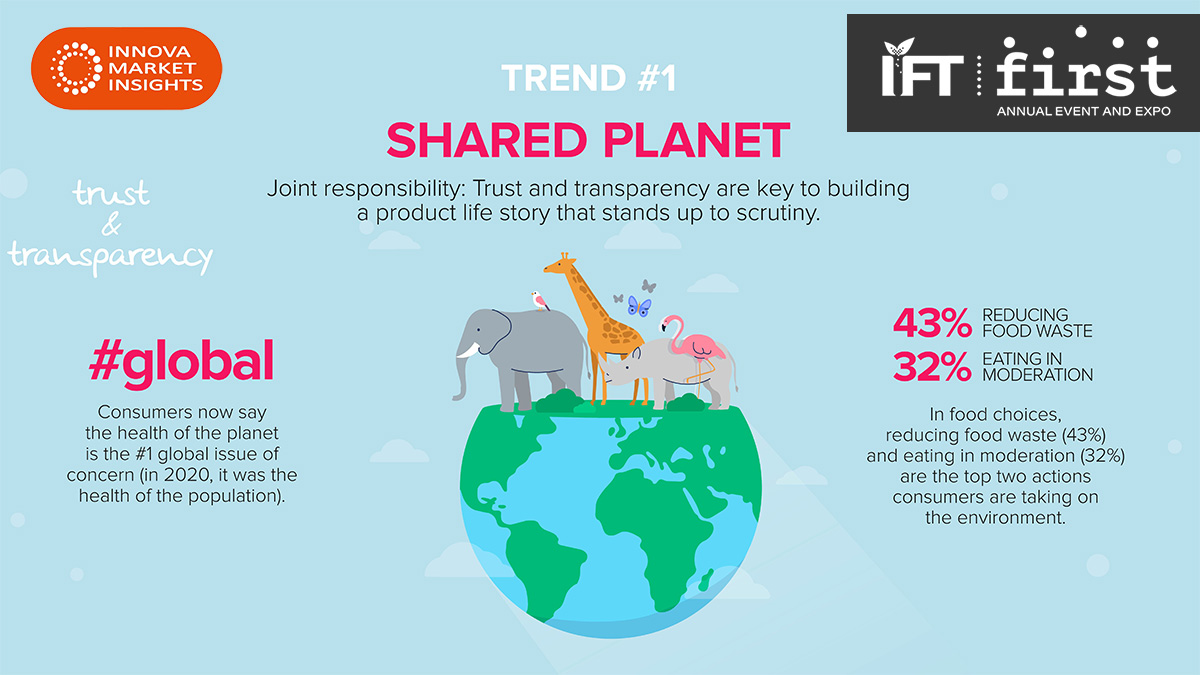‘Shared Planet’ Tops Innova’s Trends List
Consumers’ environmental awareness and interest in next-generation plant-based foods are among the year’s defining trends, the research firm reports.
 Consumers’ concerns about the health of the planet surpassed concerns about the health of the population for the first time in Innova Market Research surveys, prompting the food trend specialists at the company to designate “Shared Planet” as No. 1 on its list of Top 10 Trends for 2022.
Consumers’ concerns about the health of the planet surpassed concerns about the health of the population for the first time in Innova Market Research surveys, prompting the food trend specialists at the company to designate “Shared Planet” as No. 1 on its list of Top 10 Trends for 2022.
“People watched the world burn and flood during the lockdown, and it continues,” says Innova Insights Director Lu Ann Williams. “And anyone with Gen Z kids most likely hears about their concerns about the environment. There are cues and reminders everywhere about consuming less, buying secondhand, and recycling old clothes. It is a constant reminder to think about global issues.”
The “Shared Planet” trend continues a pattern of consumer emphasis on trust and transparency that’s been apparent for several years, the company points out. Innova cites Moonshot snacks as an example of a brand that’s successfully tapped into the “Shared Planet” positioning. The company touts its focus on environmental stewardship in everything from the use of ingredients produced by regenerative agriculture techniques to its packaging made from recycled materials.
“Plant-Based: The Canvas for Innovation” is No. 2 on Innova’s list of leading trends, underscoring the fact that nutrition and sustainability are playing bigger roles in the next generation of plant-based foods.
To attract new consumers to plant-based products, “they will have to move way past” merely mimicking meat products, says Williams. “Chefs are great at expanding our imaginations when it comes to what’s possible with plants. More and more restaurants feature plant-based options that bring home how meat doesn’t have to be at the center of every plate.
“And plants can be used in new ways to make beverages exciting,” Williams continues. “Think about functional benefits and flavors,” she adds.
Other trends Innova identified include the growing role of technology in food product development, shifting consumer eating patterns. and strong interest in the microbiome’s role in health.
Innova Market Insights Trend Talk Schedule
- 10:30 a.m. – 11 a.m. Health Strategies in Beverages
- 11:30 a.m. – Noon Innova’s Top 10 Trends 2022
- 12:30 p.m. – 1 p.m. Plant-Based: The Canvas for Innovation
- 1:30 p.m. – 2 p.m. Positive Nutrition for Holistic Health
- 2:30 p.m. – 3 p.m. Trends and Opportunities in the Sweetener Category
- 3:30 p.m. – 4 p.m. Who’s Snacking on What: Consumer Insights
Digital Exclusives

FIRST Fireside Chat Presentations
Fireside Chats bring the future into focus and discuss current trends and opportunities.

Business FIRST Presentations at IFT FIRST
The Business FIRST Stage tackles global issues and showcase trends in food, food tech, and the science of food. Business FIRST is presented by IFT's flagship magazine, Food Technology.

10 Food Trend Predictions for 2022
The editors at Food Technology magazine, published by the Institute of Food Technologists (IFT), have announced their predictions for the hottest food trends for 2022.
Food Technology Articles

How to Achieve EPR-Forward Packaging
In this two-part series, the author explores the history of Extended Producer Responsibility (EPR), what is needed to help EPR succeed, and how brands can best prepare for EPR.

Vickie Kloeris Shares NASA Experiences in New Book, Consumers Are Confused About Processed Foods’ Definition
Innovations, research, and insights in food science, product development, and consumer trends.

Top 10 Functional Food Trends: Reinventing Wellness
Consumer health challenges, mounting interest in food as medicine, and the blurring line between foods and supplements will spawn functional food and beverage opportunities.

Keeping the ESG Promise
An infographic describing food and beverage companies’ outlooks regarding ESG initiatives.

Better-for-you products on display at Natural Products Expo West
A photo overview of products shared at the 2024 Natural Products Expo West in Anaheim, Calif.
Recent Brain Food

A New Day at the FDA
IFT weighs in on the agency’s future in the wake of the Reagan-Udall Report and FDA Commissioner Califf’s response.
Members Say IFT Offers Everything You Need to Prepare for an Uncertain Future
Learn how IFT boosts connections, efficiencies, and inspiration for its members.

More on the FDA's Food Traceability Final Rule
In a new white paper, our experts examine the FDA’s Food Traceability Final Rule implications—and its novel concepts first proposed by IFT.
Job Satisfaction in the Science of Food is High but Hindered by Pain Points
IFT’s 2022 Compensation and Career Path Report breaks it down.


